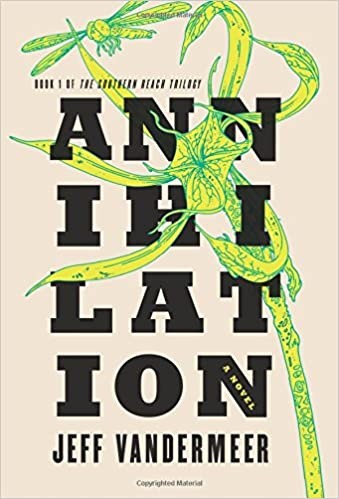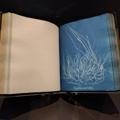1) "Our mission was simple: to continue the government's investigation into the mysteries of Area X, slowly working our way out from base camp.
The expedition could last days, months, or even years, depending on various stimuli and conditions. We had supplies with us for six months, and another two years' worth of supplies had already been stored at the base camp. We had also been assured that it was safe to live off the land if necessary. All of our foodstuffs were smoked or canned or in packets. Our most outlandish equipment consisted of a measuring device that had been issued to each of us, which hung from a strap on our belts: a small rectangle of black metal with a glass-covered hole in the middle. If the hole glowed red, we had thirty minutes to remove ourselves to 'a safe place.' We were not told what the device measured or why we should be afraid should it glow red. After the first few hours, I had grown so used to it that I hadn't looked at it again. We had been forbidden watches and compasses."
2) "The deserted village had so sunk into the natural landscape of the coast that I did not see it until I was upon it. The trail dipped into a depression of sorts, and there lay the village, fringed by more stunted trees. Only a few roofs remained on the twelve or thirteen houses, and the trail through had crumbled into porous rubble. Some outer walls still stood, dark rotting wood splotched with lichen, but for the most part these walls had fallen away and left me with a peculiar glimpse of the interiors: the remains of chairs and tables, a child's toys, rotted clothing, ceiling beams brought to earth, covered in moss and vines. There was a sharp smell of chemicals in that place, and more than one dead animal, decomposing into the mulch. Some of the houses had, over time, slid into the canal to the left and looked in their skeletal remains like creatures struggling to leave the water. It all seemed like something that had happened a century ago, and what was left were just vague recollections of the event.
But in what had been kitchens or living rooms or bedrooms, I also saw a few peculiar eruptions of moss or lichen, rising four, five, feet tall, misshapen, the vegetative matter forming an approximation of limbs and heads and torsos. As if there had been runoff from the material, too heavy for gravity, that had congregated at the foot of these objects. Or perhaps I imagined this effect."
3) "'Ghost bird, do you love me?' he whispered once in the dark, before he left for his expedition training, even though he was the ghost. 'Ghost bird, do you need me?' I loved him, but I didn't need him, and I thought that was the way it was supposed to be. A ghost bird might be a hawk in one place, a crow in another, depending on the context. The sparrow that shot up into the blue sky one morning might transform mid-flight into an osprey the next. This was the way of things here. There were no reasons so mighty that they could override the desire to be in accord with the tides and the passage of seasons and the rhythms underlying everything around me."
4) "It was later than I had thought when I emerged from below, the sky taking on the deep amber hue that marked the beginning of late afternoon. The sea was ablaze with light, but nothing beautiful here fooled me anymore. Human lives had poured into this place over time, volunteered to become party to exile and worse. Under everything lay the ghastly presence of countless desperate struggles. Why did they keep sending us? Why did we keep going? So many lies, so little ability to face the truth. Area X broke minds, I felt, even though it hadn't yet broken mine. A line from a song kept coming back to me: All this useless knowledge."
5) "But the longer I stared at it, the less comprehensible the creature became. The more it became something alien to me, and the more I had a sense that I knew nothing at all about nature, about ecosystems. There was something about my mood and its dark glow that eclipsed sense, that made me see this creature, which had indeed been assigned a place in the taxonomy—catalogued, studied, and described—irreducible down to any of that. And if I kept looking, I knew that ultimately I would have to admit I knew less than nothing about myself as well, whether that was a lie or the truth.
When I finally wrenched my gaze from the starfish and stood again, I could not tell where the sky met the sea, whether I faced the water or the shore. I was completely adrift, and dislocated, and all I had to navigate by in that moment was the glowing beacon below me."
6) "I do not know how this thorn got here or from how far away it came, but by luck or fate or design at some point it found the lighthouse keeper and did not let him go. How long he had as it remade him, repurposed him, is a mystery. There was no one to observe, to bear witness—until thirty years later a biologist catches a glimpse of him and speculates on what he might have become. Catalyst. Spark. Engine. The grit that made the pearl? Or merely an unwilling passenger?
And after his fate was determined ... imagine the expeditions—twelve or fifty or a hundred, it doesn't matter—that keep coming into contact with that entity or entities, that keep becoming fodder and becoming remade. These expeditions that come here at a hidden entry point along a mysterious border, an entry point that (perhaps) is mirrored within the deepest depths of the Tower. Imagine these expeditions, and then recognize that they all still exist in Area X in some form, even the ones that came back, especially the ones that came back: layered over one another, communicating in whatever way is left to them. Imagine that this communication sometimes lends a sense of the uncanny to the landscape because of the narcissism of our human gaze, but that it is just part of the natural world here."





